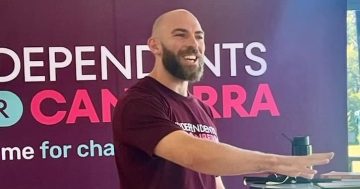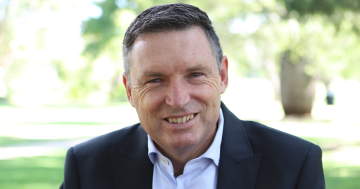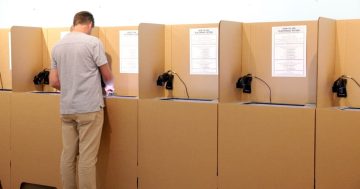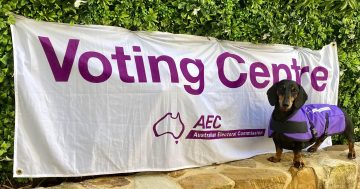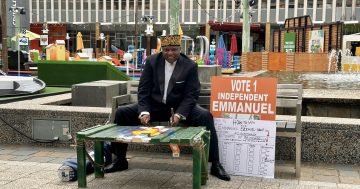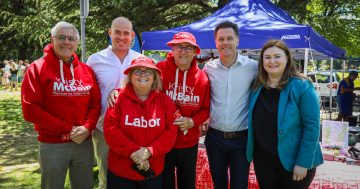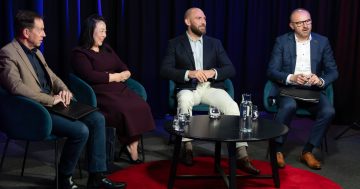In our continuing series of Email Interviews with local candidates in the coming Federal Election we bring you Darren Churchill – the Australian Democrats candidate for the House of Representatives seat of Fraser and our first House of Representatives respondee at that.
Darren Churchill’s responses, in full and unedited, can be found below:

Q1. Provide a short (no greater than 200 word) employment application style Resume (CV), including what work have you done apart from being a politician or political staffer or party/union/lobby employee and what experience or qualifications you have with regards to economic management?
A1. I’m Darren Churchill, the Australian Democrats candidate for Fraser. I’m a qualified Social Science teacher. I’ve taught in a variety of schools in both NSW and the ACT, mostly on a Relief basis. I have also worked in a variety of other occupations including hospitality (pub, waiter), retail (corner shop), cleaner and as a Public Servant. I have worked in the music industry doing live sound and lighting. And for a while I was involved in band management. I am currently employed in the fitness industry teaching Boxfit and Circuit.
I was active as a volunteer in the campaign to reinstate South Sydney Rabbitohs to the NRL…And was active in Canberra Cosmos and Belconnen Blue Devils Supporters Groups (including co-writing the Supporters Group column for the Match Day Programme).
I am a practising Anglican. And regard myself as a liberal-catholic Christian and socially progressive. I have strong views in favour of human rights, equality, social justice and inclusiveness.
My interests include: politics, football (all codes), music and reading.
Economic Management: I have a Bachelor of Economics from the University of Newcastle and a Graduate Diploma in Education (Secondary) Social Science from the University of Wollongong.
Q2. What would you like to see as the first piece of legislative change brought about by your Government? What are your personal goals for your first year representing the ACT?
A2. Some of the first legislation I’d like to see from a Democrats government (or introduced by me a cross-bencher) is national Human Rights legislation, Paid Maternity Leave; housing affordability and a staged withdrawal of troops from Iraq;. These will do for starters.
My personal goals in my first year of representing the people of Fraser are to listen to my electorate, respond to their needs and to carefully work at being a strong voice from the progressive centre for Fraser.
Q3. What private opinions do you hold which are different to those of your party? On which issues do you disagree with your Party’s stated position?
A3. The beauty of the Australian Democrats is that our parliamentarians must vote with their conscience on all issues. Things are discussed in the party room but when it comes to voting in the House/Senate the interests of our electorates and consciences are always to be put first when a position of agreement can’t be reached.
Q4. Are you in favour of fixed election terms? Why or why not and if so what length of term are you in favour of and why?
A4. Yes, it’s time we had fixed terms for Federal Parliament. I would like to see four years for the House of Representatives and eight years for the Senate. It would stop elections being timed for political expediency, would increase stability and would reduce the number of elections.
Q5. Do you think that it is important for the Prime Minister and their family to live in Canberra? Why or why not?
A5. The principle residence of the Prime Minister is The Lodge. The secondary residence of the Prime Minister is Kirribilli House. I’d like to see them used in that order.
Q6. Do you consider that making observations about the structure and makeup of the other major political party as beneficial to your own party’s role in the election?
A6. The structure and makeup of all political parties is really a matter for the members of the party in question. The Australian Democrats are a political party which is not financed by vested interest groups. We a broad-based party and all members get a vote on all issues including leadership.
Q7. What are you thoughts on the permanent trading of water entitlements, as per The National Water Initiative (http://www.dpmc.gov.au/water_reform/nwi.cfm), and do you believe that giving water a tradable, economic value is really the best method to ensure that this scare Australian resource will be utilized sensibly in the future?
A7.Any water rights trading system needs to get the balance right between the environment and the economic interests. A uniform national system has to recognize this. There is nothing wrong with providing greater certainty for irrigators and financiers. But an effective process is needed to ensure that water entitlements in over-allocated systems are kept at sustainable levels. We really need a cultural change in the way water is used and proper agreement between all states/territories and the Commonwealth on how it is to be managed.
Q8. Canberra has a large student population and Govt funding per capita for public education facilities seems to be on the slide with there being an apparent shift towards encouraging more people to enter the private education sector. What are your thoughts on this?
What initiatives would you pursue in regard to HECS fees, full fee paying uni courses, increasing/decreasing Austudy payments, funding for education/ R&D/communications infrastructure and assistance or encouragement to private sector research and technology companies?
What measures will you take to ensure the best possible education is available to all Australians?
A8. Higher education should be funded as an investment in Australia’s future. Access to publicly funded higher education should be available to all. I believe that higher education is a right, not a privilege and the government has an obligation to fund education and make it accessible and available. This includes the abolition of full fees for domestic students. The HECS repayment threshold should not kick in until income reaches the level of average male earnings. I would eventually like to see HECS phased out and free education returned. Income support for students (AUSTUDY, etc) should be pegged to the Henderson Poverty line. Base funding for universities is grossly inadequate – it must be increased significantly. And that includes free, independent research by academics.
Q9. What’s the single most pressing issue in your electorate (local electorate issue – not a broader issue that has an impact on your electorate) and how do you plan on addressing it?
A9. I think water supply is an important issue, particularly as we head into what is likely to be another very hot Summer. A range of measures. need to be implemented to conserve our water and increase water efficiency.
Q10. Suppose that you and I are stuck in an elevator for 5 minutes. You know nothing about me other than I’m enrolled to vote in your electorate. What do you say to convince me to vote for you.
A10. I don’t think anyone wants to have a politician going on at him/her when trapped in a confined space. I think I would talk about much the same sort of things that we might if we were standing in a long supermarket queue. Just casual chat.












